#Eniola Aluko
Explore tagged Tumblr posts
Text
Who is Eniola Aluko? First African Woman Appointed to Board of Female Football Club in Italy

Eniola Aluko, a Nigerian-born British former sports director for Aston Villa and Angel City in England, has made history by becoming the first African female to make the board of Italy’s female top-flight football club FC Como Women.
Mercury 13, an investment group focused on the development of women’s football clubs, recently finalised its $100 million acquisition by securing a controlling stake in FC Como Women, a team competing in Italy’s Serie A. A consortium led by Victoire Cogevina Reynal, Mario Malave, Eniola Aluko and Women in Football’s Ebru Koksal, the group last year announced plans to acquire women’s soccer clubs across Europe and Latin America.
FC Como Women, currently playing in the top division of Italian women’s football, is located in the picturesque region around Lake Como, known for its affluent residents like George Clooney and Richard Branson. The team plays its home matches in Seregno, approximately 14 miles south of the lake, and attracts an average crowd of 1,700 spectators per game.
Transitioning from her playing career, the Lagos-born has pursued football broadcasting and now ventures into sports ownership with the Mercury 13 group. Her ownership of Como FC not only marks a historic milestone for black women in Italian football but also signals a significant step forward for diversity and representation in sports ownership.
Growing Up
Born in Lagos, Nigeria, Eniola Aluko moved to Birmingham in England when she was six months old, where she developed a passion for football while playing with her brother and his friends. She began her career at Leafield Athletic Ladies before joining Birmingham City Ladies’ youth team, where she made an impactful debut at just 14 years old.
The Mercury 13 group’s commitment to investing in women’s football teams underscores the growing interest and investment in the sport globally. With Eniola Aluko’s leadership, the group aims to build a portfolio of women’s clubs, leveraging the increasing popularity of women’s football to drive growth and development in the sport.
Football Journey
Eni Aluko, who grew up playing football alongside her brother Sone Aluko and his friends, also engaged in other sports like tennis and was a dedicated supporter of Manchester United.
The 37-year-old football journey began at Leafield Athletic Ladies, followed by a stint at the youth team of Birmingham City Ladies under the guidance of manager Marcus Bignot.
Before retiring from professional football in January 2020, Eniola Aluko also provided television commentary on football, including FIFA Men’s and Women’s World Cups.
From Football Punditry to Ownership
Eniola Aluko’s journey from professional player to club owner is a testament to her dedication to football to make a positive impact. As an established figure in the football world, her involvement is expected to elevate the profile of women’s football in Italy and inspire future generations of black sports investors and owners.
She has been a regular broadcaster for live football on ITV, BT Sport, Amazon Prime and Fox Sports in the USA, including men’s Premier League matches and Women’s Super League since 2014. She was the first Sporting Director for Angel City FC in the American National Women’s Soccer League and formerly held the position of Sporting Director at Aston Villa Women’s Football Club from January 2020 to June 2021
The acquisition of FC Como Women by the Mercury 13 group, led by Eniola Aluko, represents a significant milestone in Italian football history.
4 notes
·
View notes
Text
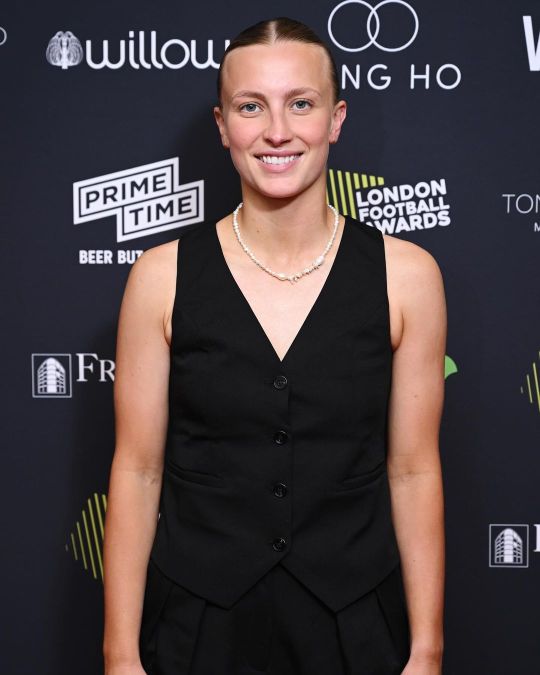
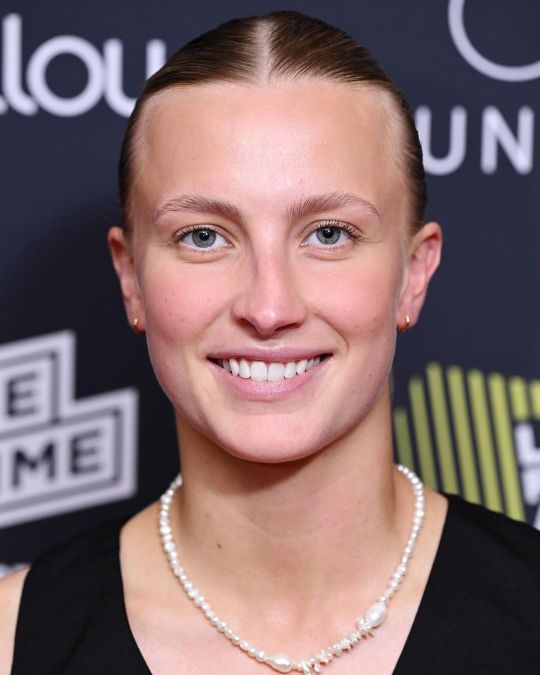
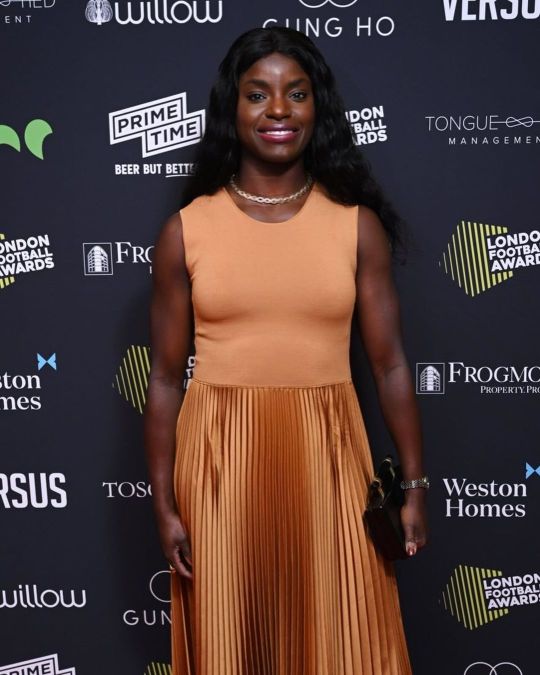

1 note
·
View note
Text
Louis in 'Under The Tongue' (2024) - part III
© adidas
#louis#under the tongue#adidas predator#adidas#adidas football#dec 11th#football louis#and a little eniola aluko cameo#video#m#utt clips
23 notes
·
View notes
Text
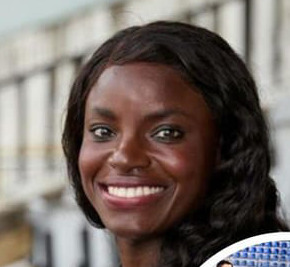
Eni Aluko is a part owner of FC Como
The primary owner is financial group, Mercury13
https://www.theguardian.com/football/2024/mar/12/mercury13-the-group-aiming-to-rethink-football-ownership-moving-the-goalposts
#RMSoccer
0 notes
Text


Louis Tomlinson was featured in Adidas’s documentary dubbed ‘Under The Tongue’ to celebrate the impact of the Predator sneakers on football on its 30th anniversary. The shoe brand teased snippets of the documentary on their Instagram on December 5, 2024.
Football and music fans were quick to spot the former One Direction star seated comfortably as he joined football stars and aficionados like David Beckham, Zinedine Zidane, Eniola Aluko and Jude Bellingham, amongst others, to pay homage to the legendary footwear.
Louis Tomlinson has been a lifelong fan of football and has never shied away from expressing his love for the game. Per the Yahoo! News report of July 1, 2024, the singer joined his favorite club, Doncaster Rovers, as a reserve player in 2013.
The Back To You hitmaker also launched his solo career with a video filmed around Doncaster which featured Louis Tomlinson on the pitch at the Keepmoat Stadium.
instagram
As one with a passion for football, like the others featured in the documentary, Louis Tomlinson explores the cultural significance of the Predator shoes and how they changed the trajectory of football.
The video sees Craig Johnston, the brain behind the iconic silhouette, recounting his journey from coaching children’s football in Australia to designing the soccer boots that graced the feet of football icons.
Pete Martin of SoccerBible, who is collaborating with Adidas on the documentary project also spoke about the legacy of the Predator and stated that it was an honor to make Under The Tongue alongside Keane Pearce Shaw.
He added:
"A boot with such personality too, not only does it mean so much to the culture of the game but it has been an unrivaled yet consistent giver of glory."
Nick Craggs, who is the Global Football General Manager of Adidas, explained the rationale behind the documentary and its impressive lineup of athletes and superstars:
“Predator changed the game. We know what it means to us all at Adidas but as we come to the end of its 30thanniversary we felt it was fitting to hear from those who played such a crucial role in cementing its place in football culture."
You can watch the 60-second trailer on Instagram at Adidas football to catch a glimpse of Louis Tomlinson and watch the full documentary on December 11, 2024, on the Adidas Football YouTube channel.
- Soapcentral, 5.12.2024
#adidas#adidas predator#under the tongue#5.12.2024#louis press#louis update#louis tomlinson#louisunderthetongue
117 notes
·
View notes
Text

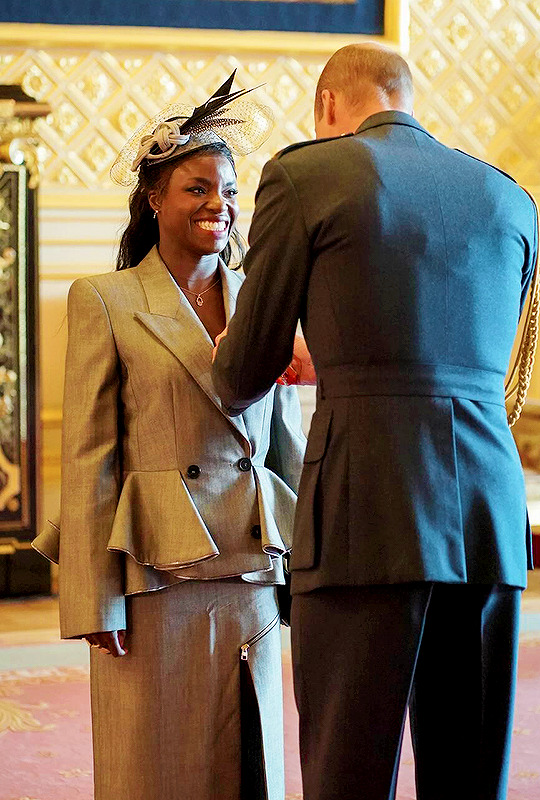
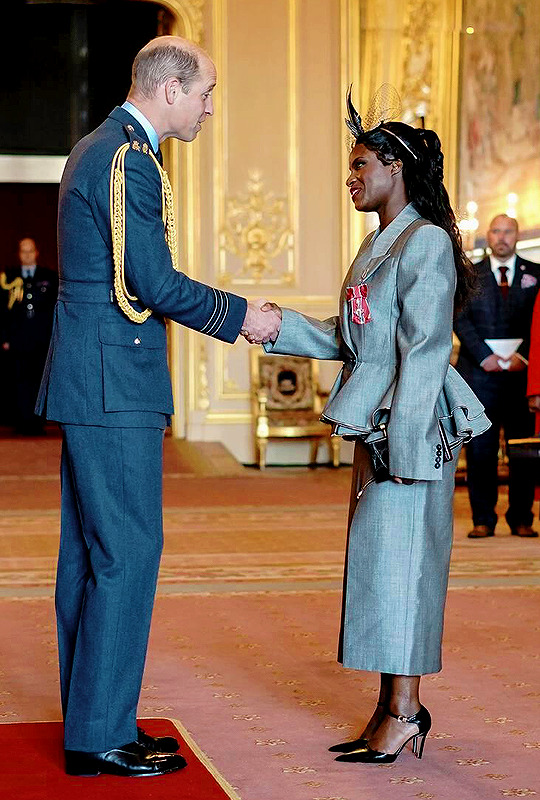
British Royal Family - The Prince of Wales made Miss Eniola Aluko, from Hampton, a Member of the Order of the British Empire at Windsor Castle, Berkshire. The honour recognises services to association football and to charity. | November 1, 2023
#royaltyedit#theroyalsandi#prince of wales#prince william#will edit#will 2023#will edit 2023#will solo#will solo 2023#will nov 2023#will investiture nov 2023#british 2023#british edit#british edit 2023#british nov 2023#nov 2023#2023#british royal family#my edit
100 notes
·
View notes
Text
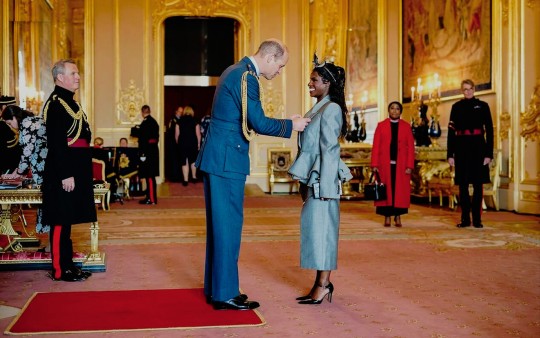

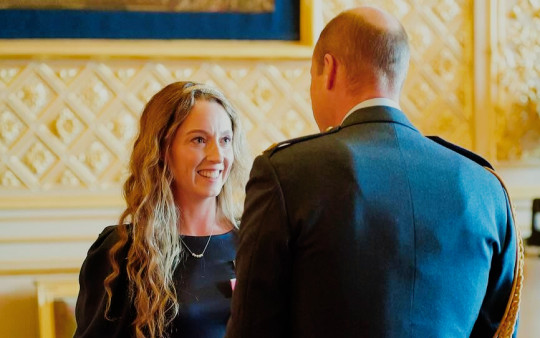
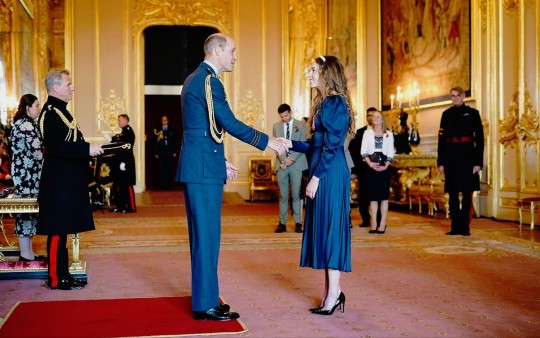
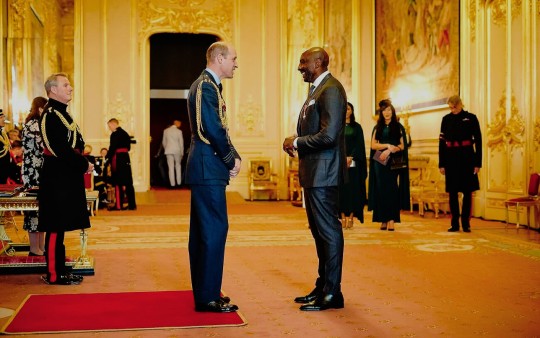
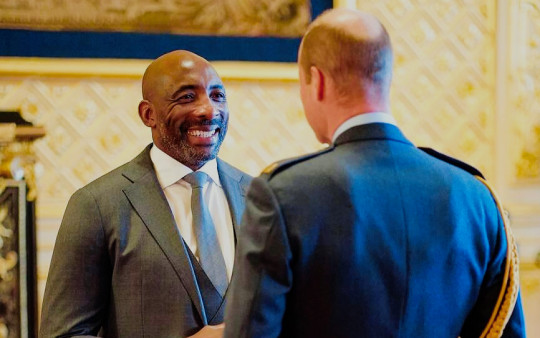
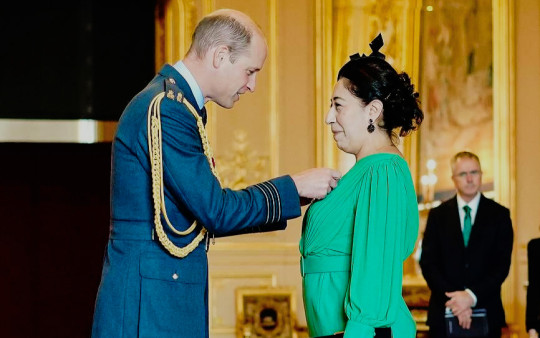


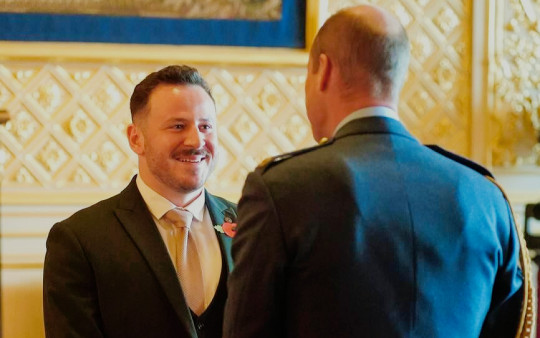
THE PRINCE DIARIES ♚
1 NOVEMBER 2023 || INVESTITURE CEREMONY, WINDSOR CASTLE
The Prince of Wales hosted an Investiture Ceremony at Windsor Castle.
He presented Honours to a range of people from across the UK and in varied fields. Among those honored were Ayette Bounouri (Queen's Gallantry Medal), Eniola Aluko with her (MBE), Fallon Sherrock (MBE), Johnny Nelson (MBE), Sebastien Bechara (MBE) and Non Stanford (MBE) among others.
#prince of wales diaries#prince of wales diaries 23#prince of wales#the prince of wales#prince william#william wales#british royal family#british royals#royalty#royals#brf#royal#british royalty#duke of cambridge#1112023#InvestitureNov23#my edit#royaltyedit#royalty edit
35 notes
·
View notes
Note
https://www.tumblr.com/thewebbloghouse/767250524744679424/i-dont-think-the-other-anon-meant-it-as-a-slight?source=share
There's a lot of racism too. And the region. Because other famous couples like Dvd and Ellie, Magda and Pernille, didn't have much negativity and homophobia.
Like when Geyse posted a photo of her girlfriend and was criticized by United fans. They filled her comments with homophobia.
Believe me. I saw a lot racist comments. Jess said once, that AKB got threat comments, because she is together with her.
But it's not just couples. LJ often gets racist comments, remember when she got the red card or Eniola Aluko when she was announced as sport director for Angel City.
Welcome to the middle ages.

2 notes
·
View notes
Text
Breaking Boundaries or Breaking Point? Joey Barton's Diatribe on Women Football Commentators
In the evolving world of football broadcasting, the game's flow is complemented and enriched by the voices describing its details. Recent comments regarding female broadcasters within men’s football made by former footballer Joey Barton has created uproar. As football fans we are not merely spectators, we are active participants, engaging in a larger conversation that helps to shape our experiences of the beautiful game. Interestingly, Barton’s recent remarks extend further than a single conversation: his comments added fuel to existing, wider conversations about diversity. Are we witnessing a necessary evolution in football commentary, or has the push for diversity reached considerable challenges?
What is happening?
Barton’s recent remarks, that began on the social media ‘X’ have sparked numerous reactions across the football community and beyond. Essentially, he is rejecting the idea of women having commentary roles in men’s football, branding this to be part of a broader ‘woke agenda’. His statements are not merely personal observations, deliberately stirring discussion about wider societal change and gender dynamics in the world of football broadcasting.
Joey Barton argues that he’s not against women because of their gender; he doesn’t like the principle of women being awarded roles that are important in men’s football as a way of showing people that they are inclusive. He believes that in football commentary people should be selected based solely on their skillset even if that means that there will be no women.
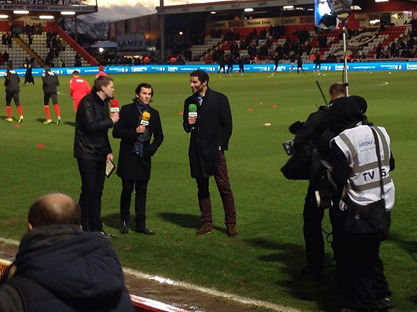
History of Women in Football Commentary
Sports commentary has had a long history of unequal treatment based on gender. Women have had a tough time getting into commentary for many years, and when they do their contributions are often not appreciated or taken seriously. Old-fashioned, stereotypical ideas and conventions about what men and women should do have shaped people’s perceptions of women football commentators. Barton’s comments fit into a similar narrative from history, where women are kept on the sidelines, trying hard to overcome long-standing prejudices. As described by Ali Bowes et al 2023 the increased inclusion of women as pundits in televised match coverage has been a gradual process. In 2007 Jacqui Oatley became the first female football commentator on the television programme Match of the Day since its origins in 1964. The next female was former England International Eniola Aluko, breaking ground in 2014 as the first women in this presenting role. Aluko notably contributed to the television coverage of the 2018 World Cup, pushing her into the media spotlight.
Women reporters have often found it challenging to get players and coaches and even the audience to see them as reporters first and women second. A study made by Swanson 2009 was conducted where he interviewed female journalists. He found that they “spoke of a love or passion for sports” with the majority playing one or more sports in the past. This discredits the suggestion that women commentators are less knowledgeable, qualified, and professional than their male counterparts.
Has there been improvement?
Over a five-year span there has been an increasing number of female pundits. Looking at the research from David Lenton 2022 he identified that the presence of women covering men’s games, either as commentators or pundits has seen remarkable growth. It grew 5650% from 2016/17 to 2020/21 (from 12 appearances to 690). Two seasons ago (2020/21) saw 2500 male commentators and pundits appearing in all televised men’s games - a difference of 1810. While the female representation has grown dramatically, there is still a huge gap to fill.
Push for diversity
The push for diversity is a vital aspect of progress in the sports industry. It helps to break down historical barriers and provide opportunities for individuals regardless of gender. The drivers behind the push include the recognition that talent and expertise are not limited by gender but can be found in individuals with diverse backgrounds and experiences. Alex Scott is a brilliant example of this. After retiring from football in 2017 she broke major barriers by becoming the first female football pundit at the World Cup for the BBC and joined Sky Sports Super Sunday as the first female pundit. Findings from 2017 found that 88.5% of sport reporters were male which makes Alex Scott’s achievement even more impressive.
Like any significant shift, there can be unintended consequences. As depicted by Burch et al 2023, even with female commentator's obvious expertise they often face scepticism about their knowledge and competence in sports. Additionally the rise of online platforms has exposed them to a wave of harassment and abuse, perpetuating a hostile and discouraging environment. However, within the industry the ongoing efforts to promote gender equality are evident. Gender pay gaps still persist, with female journalists earning less than their male counterparts for similar roles and responsibilities.
Some people support Barton and say that everyone has a right to an opinion. However, many others like me disagree with Barton’s outspoken standpoint. Football commentary and broadcasting should be platforms that embrace diversity and inclusivity. Dismissing the idea of women having roles in football commentary sustains current biases and contributes to the ongoing issue of sexism in football commentary. He pointed out how you need to play football at a high level to be able to talk about it, however there are many talented women broadcasters that didn’t play football at all. A couple that spring to my mind is Kate Abdo and Laura Woods. This makes me question whether Barton’s idea of who is ‘Credible’ is more about keeping things the way they’ve always been and maintaining sexism in football commentary.
So what is the solution? Football commentary has always been opinionated people sharing their opinions more than sharing facts. Fans may watch certain sport shows because they like personalities such as the CBS Sports Champions League Show, which is full of personalities including the likes of Thierry Henry, Micah Richards, Jamie Carragher and Kate Abdo. What arguably makes the show entertaining is that they are brilliant personalities while also reporting on the football. This has nothing to do with their gender which is why I don't understand Joey Barton's sexist comments.
Seeing change in the future
Football, as a dynamic and influential part of our cultural landscape, provides a unique platform for connection, dialogue and debate. Barton’s comments have sparked discussions reflecting the extremes within the football community. On one side, fans unite with a shared goal of supporting one another; while on the other side, you have people's passion which blinds their negative comments and viewpoints.
The necessary evolution in football commentary demands a positive change in fan engagement. Supporters should channel their voices to drown out the negativity. Embracing this shift will not only enhance the fan experience but also contribute to creating an inclusive and supportive environment within the realm of football commentary.
What’s your take on Joey Barton’s Views? Is the push for diversity in football commentary a necessary evolution, or does it risk undermining the credibility of the sport? Share your thoughts below and join the conversation.
N0993793
2 notes
·
View notes
Text
Dug back in the archives and I found out I was at a game and saw this line up play 🤯🤯
England Starting XI: Karen Bardsley; Claire Rafferty (Alex Greenwood 61), Steph Houghton(C), Casey Stoney, Lucy Bronze; Jill Scott, Karen Carney (Jade Moore 82), Katie Chapman (Fran Kirby 72), Lianne Sanderson (Fara Williams 61); Toni Duggan; Ellen White (Eniola Aluko 61). (4-4-2)

4 notes
·
View notes
Note
drama https://equalizersoccer.com/2023/05/16/angel-citys-hbo-series-insight-sean-nahas-freya-coombe-eniola-aluko/
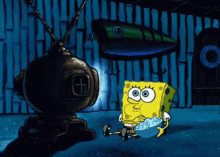
i love drama
4 notes
·
View notes
Note
The poorest thing she said was "There is no racism in eomens football."
Hello Mead. Do you ever spoke to Jess, who get's a lot racist comments online or Eniola Aluko?
omg yea that was fucking nut. How the fuck did I forget about that
1 note
·
View note
Text
$100M Investment: Eniola Aluko Makes History as First Female Black Football Club Owner in Italy
Nigerian-born, former British footballer Eniola Aluko recently made history as the first black woman to own a football club in Italy.
0 notes
Text
05 December 2024
Rounding off the 30th anniversary of football’s most iconic boot in the only way that seems fitting, SoccerBible and adidas present the trailer for ‘Under The Tongue’, a feature-length documentary exploring the seismic impact the Predator franchise has had on the beautiful game, both on and off the pitch.
Few boots – if any – can claim to have had the same level of impact on the game as the adidas Predator, both in a performance and cultural sense. Through constant evolution it continues to be the boot of generation after generation, performing on pitches throughout the world at the highest level of the game. Now, adidas and SoccerBible take a deep dive into the never-before-told story of football’s most iconic boot.
instagram
‘Under The Tongue’ examines how a unique blend of industry-leading innovation, culture-defining design, unrivalled star power and timing all combined to create a boot that would fundamentally change the trajectory of the football boot industry and have a transformative impact on adidas as a business.
Featuring never before heard contributions from era-defining footballers such as David Beckham, Zinedine Zidane, and Eniola Aluko – as well as current stars including Jude Bellingham, Alessia Russo, Aitana Bonmatí and Trent Alexander-Arnold – the documentary is the most insightful look into what is one of the most influential and transformative boots of all time.
‘Under The Tongue’ premieres on 11 December, and will available to view from 9PM CET on the adidas football YouTube channel.
—
..and the article doesn't mention it, but as seen in the video, Louis is also in this film! :)
41 notes
·
View notes
Text
ENI ALUKO BIOGRAPHY, EDUCATION, CAREER, CONTROVERSIES AND NET WORTH
ENI ALUKO BIOGRAPHY – Eniola Aluko MBE, born on February 21, 1987, is a British-Nigerian football executive, broadcaster, and former professional player, known for her versatility as a winger and striker. She has transitioned into roles off the field, notably as a broadcaster for live football matches. Aluko made history as the first Sporting Director for Angel City FC and previously served as…
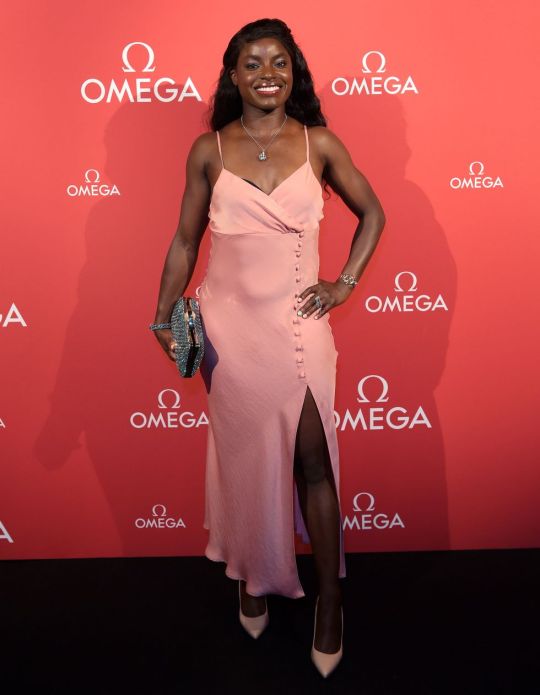
View On WordPress
0 notes
Text
Fotbollen i England växer så det knakar
Få länder har genomgått en så enorm utveckling av fotbollen som “moderlandet” England. När jag såg Chelsea för första gången 2013 ute i Tooting och träffade Emma Hayes, hennes assisterande Paul Green och landslagsspelaren Eniola Aluko efter en match mot ett amerikanskt universitetslag hävdade Hayes att England skulle ha världens bästa liga om 4-5 år. Man kan fortfarande diskutera om England har…
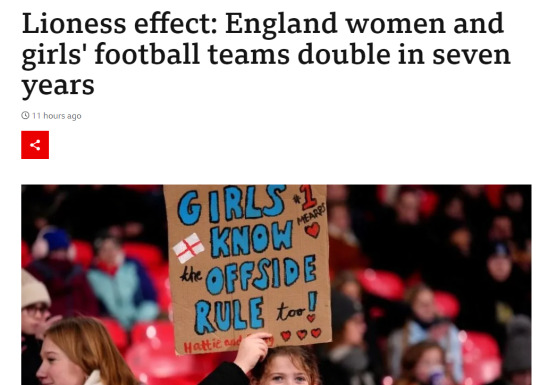
View On WordPress
0 notes